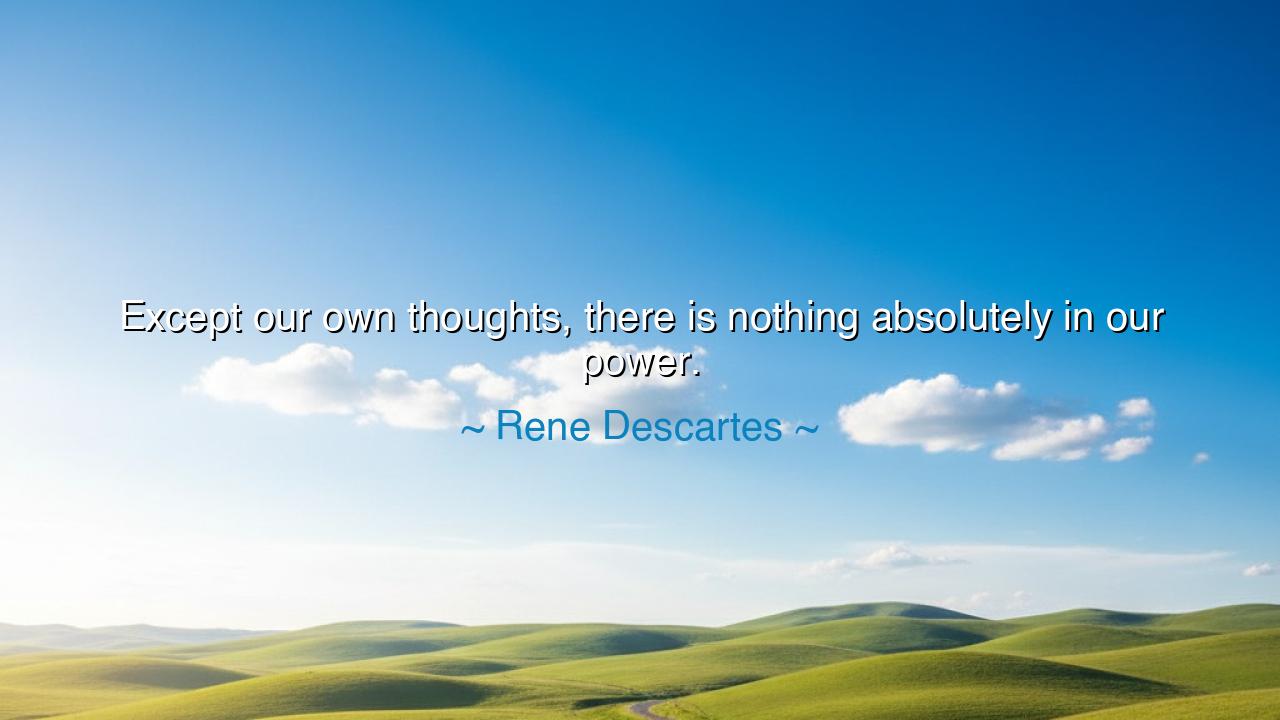
Except our own thoughts, there is nothing absolutely in our






René Descartes, father of modern philosophy, declares with piercing austerity: “Except our own thoughts, there is nothing absolutely in our power.” In these words he reveals both the weakness and the greatness of man. The world outside us—fortune, health, reputation, even the love of others—slips through our grasp like sand in the wind. But one kingdom remains, sovereign and unassailable: the realm of our own thoughts. Here lies the citadel of freedom, the fortress no tyrant can breach, the domain no storm can conquer.
The ancients knew this truth long before Descartes. Epictetus, the slave-philosopher of Rome, taught that while chains may bind the body, no man can enslave the soul unless it yields its thoughts. A master may command your labor, fate may steal your health, but your judgment, your assent, your inner will—these remain yours alone. Descartes, echoing this Stoic wisdom, places all human power not in dominion over others, but in mastery of the mind.
History offers radiant examples. Socrates, condemned unjustly to death, drank the hemlock with serenity. He knew that his judges held no true power over him, for they could touch only his body, never his soul. His thoughts—calm, steadfast, devoted to truth—remained his own, and in this he triumphed over his accusers. His death was not defeat, but victory of the mind’s sovereignty.
So too with Nelson Mandela, who endured twenty-seven years of imprisonment. Stripped of freedom, work, and comfort, he yet guarded his inner realm. His captors could lock his body, but his thoughts remained untamed, nourished by visions of justice. When at last he emerged, it was not as a broken man, but as a leader tempered in the fire of mental freedom. In him we see Descartes’ truth embodied: that the one unshakable power is the dominion of the mind.
Let the generations remember: to cling to what lies beyond our control is folly, but to rule the kingdom of our own mind is strength unshaken. Wealth may vanish, kingdoms may fall, friends may betray, and the body may fail—but he who governs his thoughts remains free, undefeated, and noble. Descartes speaks as a sentinel to all seekers: guard your mind, for it is the one throne you will never lose. And in its mastery lies the beginning of all true wisdom.






PHnguyen phuong huyen
There’s something both liberating and limiting about this perspective. On one hand, it offers a sense of control — that no matter what happens, our inner world remains ours. On the other hand, it implies how powerless we are in changing external conditions. Is this view meant to comfort us in times of chaos, or to challenge us to stop seeking control where it doesn’t exist?
PNPhung Nguyen
I can’t help but think this quote carries a hint of stoicism — the belief that peace comes from mastering our internal world, not external events. But I question whether it’s possible to truly separate the two. Aren’t our thoughts shaped by the world we live in? If so, can we ever claim absolute power over them, or is Descartes expressing an ideal more than a reality?
NBVui Nguyen Ba
What strikes me about this quote is its quiet strength — the idea that the mind is the final stronghold of autonomy. Yet, I wonder how it applies to people who struggle with mental illness or intrusive thoughts. If our own mind can turn against us, does that challenge Descartes’ belief in inner sovereignty? How do we define control when our own thoughts don’t always obey us?
THLe Hoang Thien Ha
This line feels timeless, especially in an age of distraction and manipulation. Descartes seems to suggest that mastery of the mind equals true freedom. But is that still realistic today, when our thoughts are constantly influenced by media, algorithms, and social pressures? I’m curious whether modern society has made it harder to even know what our ‘own’ thoughts are anymore.
T8Le Pham Ha Tien 8a3
I find this statement deeply empowering but also a bit isolating. If only our thoughts are within our power, does that mean everything else — relationships, circumstances, even emotions — are outside of it? How does this idea influence the way we take responsibility for our actions? I’d love to hear a perspective on whether this view encourages personal accountability or promotes detachment from the world.